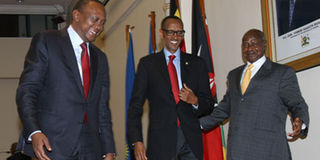Only ID card needed to travel to Uganda, Rwanda after new pact

Presidents Uhuru Kenyatta of Kenya, Yoweri Museveni of Uganda and Paul Kagame of Rwanda. President Uhuru Kenyatta has signed a pact with Uganda and Rwanda to remove travel barriers among the three countries in efforts to make it easier for entrepreneurs to operate across borders.
What you need to know:
- President Kenyatta urged entrepreneurs to take advantage of the agreement to exploit a larger market base for their agricultural and industrial products.
President Uhuru Kenyatta has signed a pact with Uganda and Rwanda to remove travel barriers among the three countries in efforts to make it easier for entrepreneurs to operate across borders.
Speaking Thursday at Mombasa International ASK Show, he said that citizens of the three countries will soon be able use their identity cards, voters’ cards (Uganda) and students’ identity cards to travel to any of the three nations.
“Time has come for us to remove colonial boundary barriers that have kept us apart and also isolated the people from interacting and doing business freely,” he said.
Currently, Kenyans travelling to Uganda or Rwanda require either a passport or a pass from the Immigration department.
Ministers are expected to finalise the plan for use of IDs as travel documents by October 15, this year, before the same is implemented in January, 2014.
Take advantage
President Kenyatta urged entrepreneurs to take advantage of the agreement to exploit a larger market base for their agricultural and industrial products.
“This is what we have agreed as leaders so that our people can interact by visiting each other’s country to do business and develop domestic tourism,” he said.
The President’s remarks put to question the fate of the other two East African Community (EAC) partner states, Burundi and Tanzani, who have remained absent during presidential and technical meetings regarding the plan.
Without mentioning the two countries, Uganda’s President Yoweri Museveni, who accompanied Mr Kenyatta, said he was excited the “integration dream” he had awaited for 50 year would become a reality in his leadership.
The EAC chairman added that President Kenyatta, his deputy William Ruto and other Kenyan leaders had injected fresh blood to the previous anaemic situation.
“I am very excited on the issue of integration, which previously was suffering from political anemia. But with President Uhuru, his DP and others, it has got fresh blood supply for its survival,” he said.
He pointed out that the 45 roadblocks on the Mombasa-Malaba highway had been reduced to two, allowing faster movement of cargo from the port.
The two presidents were speaking in the wake of the second infrastructure summit that was held in Mombasa on Wednesday and attended by South Sudan, Rwanda, Kenya, Uganda and Burundi.
The summit was a follow-up of a forum held in Entebbe two months ago during which Kenya, Uganda and Rwanda vowed to adopt measures meant to accelerate regional integration.
The countries also agreed to invest in a Sh1.6 trillion high speed railway.
Following the meeting in Mombasa, the railway has now been extended to South Sudan and Burundi.
To eradicate poverty and create employment, President Kenyatta said Kenya would have to work closely with its neighbours, adding that working in isolation would only disadvantage the country.
“If we work separately, we will not increase our economic growth nor attract investments from elsewhere because of our meager market base of only 40 million people,” he said.
He explained that integration was a key factor to boost the East African region and this could only be possible if people were allowed to move freely within it.
On agriculture, Mr Kenyatta said the government would commercialise farming through use of technology and by leveraging on irrigation schemes.
Beat middlemen
Most countries in the region are producers of coffee and tea. President Kenyatta said there was a need to work jointly in the market to beat middlemen who are benefiting the most from the region’s agriculture.
“Middlemen who do not know what coffee or tea is are making a kill because we are selling our products individually and this is giving them a loophole to exploit us,” he said.
President Museveni, on the other hand, said that the region ought to move from peasant farming to commercial farming to boost food security.
Peasant farming in the region has resulted from inheritance practices that have seen subdivision of land into increasingly smaller lots that are inadequate for commercial farming.
“Of what use is one acre of land? If a family has 10 acres and these are put into one pool for development, inheritors can become shareholders,” he said.
BY MWAKERA MWAJEFA [email protected]




